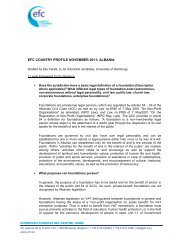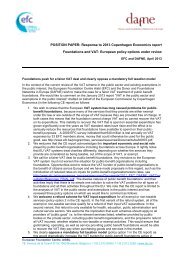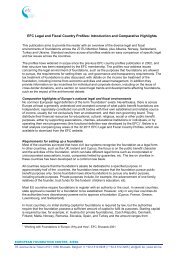European perspectives on global health: a policy glossary
European perspectives on global health: a policy glossary
European perspectives on global health: a policy glossary
You also want an ePaper? Increase the reach of your titles
YUMPU automatically turns print PDFs into web optimized ePapers that Google loves.
3. Europe must assert its role in <strong>global</strong> <strong>health</strong> governance<br />
Europe’s experiences with internati<strong>on</strong>al law<br />
and <strong>health</strong> place it at the forefr<strong>on</strong>t <strong>global</strong>ly<br />
in terms of the use of internati<strong>on</strong>al law to<br />
benefit human <strong>health</strong>. The instituti<strong>on</strong>s of the<br />
<str<strong>on</strong>g>European</str<strong>on</strong>g> Uni<strong>on</strong> have addressed, through its<br />
various treaties, public <strong>health</strong> threats to safety,<br />
<strong>health</strong> at work, envir<strong>on</strong>mental degradati<strong>on</strong>,<br />
the spread of communicable diseases and the<br />
broader impact of social and ec<strong>on</strong>omic policies<br />
<strong>on</strong> <strong>health</strong>.<br />
The Council of Europe, which both predates<br />
the <str<strong>on</strong>g>European</str<strong>on</strong>g> Uni<strong>on</strong> and has a wider regi<strong>on</strong>al<br />
membership, has taken the lead in developing<br />
internati<strong>on</strong>al law that protects public <strong>health</strong> as a<br />
human right not <strong>on</strong>ly as an issue for the <str<strong>on</strong>g>European</str<strong>on</strong>g><br />
regi<strong>on</strong> but as a <strong>global</strong> imperative. The “<str<strong>on</strong>g>European</str<strong>on</strong>g><br />
C<strong>on</strong>venti<strong>on</strong> <strong>on</strong> Human Rights and Fundamental<br />
Freedoms” was introduced in 1953, the <str<strong>on</strong>g>European</str<strong>on</strong>g><br />
Commissi<strong>on</strong> <strong>on</strong> Human Rights started work in<br />
1954, and the <str<strong>on</strong>g>European</str<strong>on</strong>g> Court of Human Rights was<br />
established in 1959. Any state wishing to become a<br />
member of the <str<strong>on</strong>g>European</str<strong>on</strong>g> Uni<strong>on</strong> must first sign and<br />
ratify the <str<strong>on</strong>g>European</str<strong>on</strong>g> C<strong>on</strong>venti<strong>on</strong> <strong>on</strong> Human Rights and<br />
accept the jurisdicti<strong>on</strong> of its court. The Court took<br />
an increased role in relati<strong>on</strong> to <strong>health</strong> issues when<br />
individuals were granted leave to take petiti<strong>on</strong>s and<br />
cases to the court in 1998.<br />
The C<strong>on</strong>venti<strong>on</strong> deals with civil and political rights ;<br />
it recognises a fundamental right to life but does not<br />
go further in specifying rights of access to <strong>health</strong> and<br />
care services. These rights are specified in the <str<strong>on</strong>g>European</str<strong>on</strong>g><br />
Social Charter first adopted by the Council of Europe in<br />
1961 and revised and reaffirmed in 1996. The Charter is<br />
part of the proposed new c<strong>on</strong>stituti<strong>on</strong> of the EU, which<br />
has not yet been ratified. It is important to note that<br />
ratificati<strong>on</strong> of these c<strong>on</strong>venti<strong>on</strong>s and charters requires<br />
the adopti<strong>on</strong> of state laws giving recogniti<strong>on</strong> and<br />
precedence to internati<strong>on</strong>al laws and courts.<br />
Because the <str<strong>on</strong>g>European</str<strong>on</strong>g> Uni<strong>on</strong> is fundamentally a legal<br />
agreement between states, with an independent legal<br />
process for settling disputes at the <str<strong>on</strong>g>European</str<strong>on</strong>g> Court<br />
of Justice ( ECJ ), many issues that might otherwise be<br />
c<strong>on</strong>sidered matters for agreements between states are<br />
adjudicated through a legal process. Thus, for example,<br />
the right to treatment in certain cases, to obtain <strong>health</strong><br />
services bey<strong>on</strong>d the borders of a particular Member<br />
State, the applicati<strong>on</strong> of working hours directives to<br />
<strong>health</strong>, acti<strong>on</strong> <strong>on</strong> tobacco and other products have all<br />
been subject to legal acti<strong>on</strong> at the ECJ.<br />
Treaties and agreements covering basic envir<strong>on</strong>mental<br />
emergencies were c<strong>on</strong>cluded at a relatively early<br />
stage in the development of the <str<strong>on</strong>g>European</str<strong>on</strong>g> Uni<strong>on</strong>, as<br />
for example, the Seveso Directive of 1982. Laws and<br />
directives c<strong>on</strong>cerning <strong>health</strong> and safety at work and<br />
other issues touching mental and physical <strong>health</strong><br />
at work such as working time and discriminati<strong>on</strong><br />
at work have also been prominent in EU legislati<strong>on</strong><br />
and directives. Given the emphasis of the EU up<strong>on</strong><br />
employment and trade it is also unsurprising that<br />
c<strong>on</strong>sumer protecti<strong>on</strong> was an early priority.<br />
The Amsterdam Treaty of 1997 calls for all EU social<br />
and ec<strong>on</strong>omic policies to be subject to <strong>health</strong> impact<br />
assessment, while the 2004 <strong>policy</strong> reflecti<strong>on</strong> Enabling<br />
Good Health for All looks forward to the establishment<br />
of mechanisms for <strong>health</strong> impact assessment to ensure<br />
that all sectors become accountable for their policies<br />
and acti<strong>on</strong>s <strong>on</strong> <strong>health</strong>, and the <strong>health</strong> theme to be taken<br />
up by the Finnish presidency of the EU in 2006 will be<br />
“Health in All Policy”.<br />
In addressing <strong>health</strong> envir<strong>on</strong>mental c<strong>on</strong>cerns, it<br />
has been increasingly realised that many issues<br />
encompass the whole of the <str<strong>on</strong>g>European</str<strong>on</strong>g> regi<strong>on</strong> and its<br />
near neighbours. The EU through its Directorate for<br />
Health and C<strong>on</strong>sumer Affairs has developed a close<br />
partnership with the <str<strong>on</strong>g>European</str<strong>on</strong>g> Office of the WHO to<br />
address regi<strong>on</strong>al c<strong>on</strong>cerns as exemplified by the WHO<br />
Protocol <strong>on</strong> Water and Health of 2005.<br />
Like other regi<strong>on</strong>s, Europe faces the challenge of<br />
improving compliance with the great body of preexisting<br />
internati<strong>on</strong>al law relevant to <strong>health</strong>. For<br />
example, the recent Envir<strong>on</strong>mental Policy Review<br />
highlights the fact that, while the EU has passed more<br />
than 200 laws <strong>on</strong> envir<strong>on</strong>mental <strong>health</strong>, including 140<br />
Directives <strong>on</strong> issues such as water quality and waste<br />
treatment, more than a third of all infringement cases,<br />
where the failure of governments to implement EU<br />
laws are investigated, relate to envir<strong>on</strong>mental issues.<br />
Improved compliance involves strengthening<br />
<str<strong>on</strong>g>European</str<strong>on</strong>g> performance under the regimes and<br />
increasing political, financial, and technical assistance<br />
to least-developed and developing countries that lack<br />
Global Health Policy Glossary<br />
45
















